|
Rotten Library > Religion > Apocalypse
Apocalypse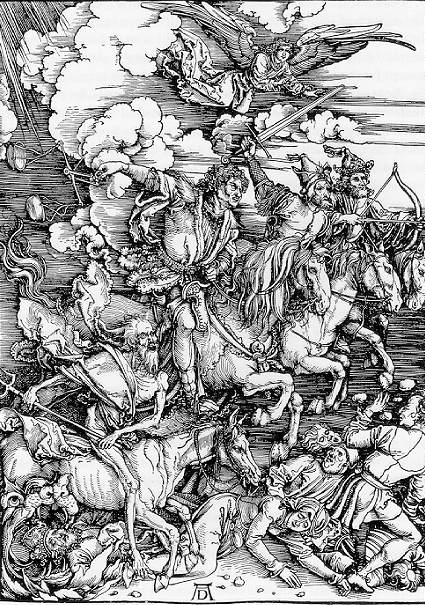 We all have our petty little problems, but it's tough to trump the End of Everything for sheer drama.
We all have our petty little problems, but it's tough to trump the End of Everything for sheer drama. Ever since the beginning of history, people have been worrying about the end of history. There's even a name for this obsession: Eschatology. It tends to crop up pretty regularly in human history, especially around large traumatic events and numerologically significant calendar notations. There's nothing quite as exciting as pondering the end of everything, to the point that some people (not to name names) are positively thrilled at its imminent arrival. What's worrisome is that some of those people are chummy with people who control Weapons of Mass Destruction. In addition to a whole slew of grass roots organizations, there are two major adherents to echatology — Christianity and Islam. Unfortunately for the stability of the world, these are the two most sizable religions in existence today. The third biggest, Hinduism, also has an eschatological bent, but more on this later. The next five biggest religions are mercifully free of apocalyptic leanings, but all five combined have fewer adherents than Christianity alone, so they hardly count. Even more unfortunately, many members of Christianity see members of Islam as representatives of Satan, and the likely instigators of Armageddon, and many members of Islam see Christians the same way (only more so). This doesn't bode well. The word apocalypse started off innocently enough. It referred to prophetic writings by Jews and early Christians starting around 200 B.C. which purported to be divine revelations. These apocalypses were often fairly innocuous, revealing creation stories or comsological architectures. But the apocalypse that got the most press was the book of Revelation, aka the Apocalypse of John, a dark and stormy piece of cryptic doomsaying that inexplicably made its way into the official New Testament in the fourth century A.D., even as hundreds of other similar works were deemed heretical and burned for being too freaky.
The book also establishes the concept of Armageddon, a final, no-holds-barred, drag-down, all-out battle royale between the forces of "good" and the forces of "evil." Islam layers a few more elements onto the whole End Times scenario, with special enthusiasm for the judgment aspect. While the interpretation of the End Times can be highly controversial within Christian circles, Islam nails it down to a formula in the Qur'an, thanks to a series of prophecies by Muhammed. You'll know it's the apocalypse when 'x' amount of famine is multiplied by 'y' amount of drought, divided by the square root of 'z' infidels. (It's any day now, in case you were wondering.) Despite the specificity of the signs that the End is near, only Allah is entitled to know when the whole thing is actually going to happen. The signs of the apocalypse depend on your religious bent, but you might be in the apocalypse if you notice one or more of the following:
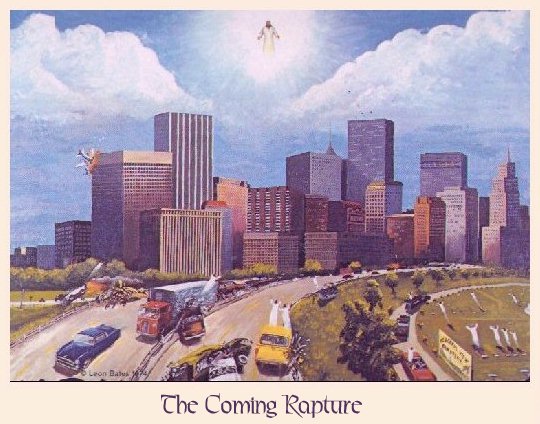
According to the true believers, the Rapture is an event in which only accredited and certifiably saved followers of Christ will be instantly transported to heaven, leaving the rest of us pathetic fuckers down here to fend for ourselves (I include you in this group, because you're visiting Rotten.com, which means the odds are very good indeed that you won't be getting a free ride, if you catch my drift). Once all the accredited Christians have been whisked away to heaven, they'll break out the popcorn and laugh at us poor heathens who have been left behind to do their dirty work, namely defeating the forces of Satan on Earth. Once we've all fought and died in the battle against the Antichrist, the Real Christians will then return to the Earth in transfigured form to run things and steal our oil supply. You might assume from all this that the future Rapturees are uncharitably blase about our unwashed little lives, but nothing could be further from the truth. True believers often considerately put bumper stickers on their cars warning the rest of us that their vehicle may suddenly careen out of control if they are whisked off to heaven during rush hour, so that we can sensibly keep a couple extra carlengths between us and them. Once you get out of the Christian-Islamic nexus of apocalyptic beliefs, things just get weirder (but at the same time, strangely more rational).
The ancient Mayans, on the other hand, defy most other religions by specifying a) that the end is very soon and b) the exact date. In all fairness, the end wasn't all that soon back when the Mayans were alive and well and building pyramids in Central America, an era of culture and wealth which ended mysteriously around 1100 AD. The Mayans kept detailed calendars, the likes of which had never been seen in the ancient world. Their long count calendar, based roughly on a 5,000 year cycle, is a massive and highly accurate list of astronomical events and seasonal occurences such as solstices and equinoxes. The Mayan long count calendar is a list of days in the Fourth Sun, the current cycle of the world. The calendar simply ends on Dec. 21, 2012 (the winter solstice), and the Mayans did not offer a calendar addendum to specify anything much happening after that. A variety of modern intepreters have taken this to mean that this is pretty much the end point of time, but since the Mayan language is still largely incomprehensible to scholars, the details of the whole thing are kind of obscure. One could argue that the Mayans just figured they had enough time to get around to doing the next 5,000 year cycle, but then bear in mind you're dealing with a mentality that felt it was reasonably urgent to chart out the first 5,000 years in hourly increments. Procrastination doesn't seem to be one of their big problems. Several modern metaphysical theorists have seized on this date, which is currently as popular an endpoint as any under discussion. Drug guru Terence McKenna, acting on advice from "hyperdimensional machine elves" encounted via shamanic hallucinogens, combined the Mayan calendar with the I-Ching to chart what he called a "fractal time wave."
Comic book auteur Grant Morrison took this idea and ran with it, in a comic series called The Invisibles which does an amazingly good job of consolidating every conspiracy theory, religion, New Age concept and pretty much every insane idea anyone ever had into a single, mostly cohesive whole, which also puts D-Day in 2012. The 2012 date appeals to a pretty wide demographic within the category of "people waiting for the end." It's potentially consistent with Nostradamus, for instance, based on the numbering of the popes (we've got two more to go and at least one of them meets a bad, early end). It's an exact date, which is always nice, and it also benefits from the application of what we shall loosely call "science" to the overall apocalyptic concept. The other appeal of the 2012 theory is that it doesn't technically call for the "end of everything" or a "Last Judgment," eliminating the unpopular and potentially painful aspects of the apocalypse while keeping all the cool weird stuff. Most 2012-ers are looking for something more like a paradigm shift than Armageddon. Depending on who you talk to, this can involve a collapse of linear time, the arrival of aliens and/or hyperdimensional buddies, the discovery of immortality, the return of Atlantis, etc., etc. The lack of dogmatic consistency among 2012-ers means they don't offer as many memorable and entertaining concepts as the Christians enjoy. But on the other hand, a massive UFO landing sounds like it has a lot more potential for fun than the Ride of the Four Horsemen. That whole pestilence thing, I dunno, I think I'd rather take a pass, assuming I get a choice... |
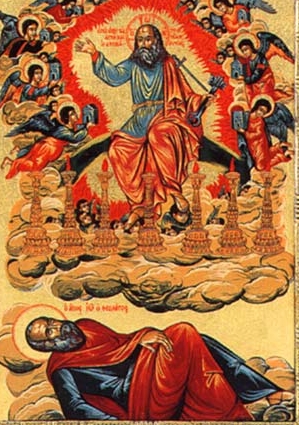 The book of Revelation sets the standard for the Western view of the end of the world. It includes all the major elements that one might see on
The book of Revelation sets the standard for the Western view of the end of the world. It includes all the major elements that one might see on 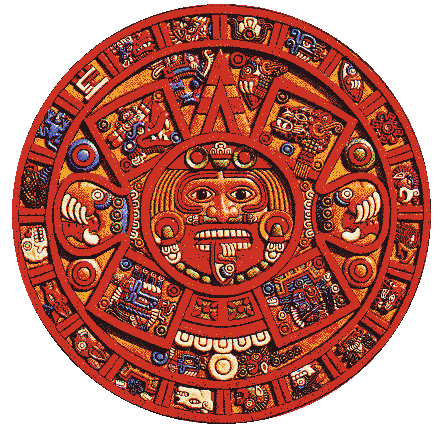 The Hindus believe that the universe is running a cycle which will culimate in the Cosmic Reboot at the end of the Fourth Age (which we are currently enjoying). Our current world exists in the Age of Kali, the busty, naked multi-armed goddess of destruction. How hot is that? Whoo-hoo! Kali rules an age of strife, anger and war on earth, which will culminate in the destruction of everything to pave the way for a new world. Unlike the Christians and Muslims, the Hindus don't believe this event is coming any time soon.
The Hindus believe that the universe is running a cycle which will culimate in the Cosmic Reboot at the end of the Fourth Age (which we are currently enjoying). Our current world exists in the Age of Kali, the busty, naked multi-armed goddess of destruction. How hot is that? Whoo-hoo! Kali rules an age of strife, anger and war on earth, which will culminate in the destruction of everything to pave the way for a new world. Unlike the Christians and Muslims, the Hindus don't believe this event is coming any time soon. 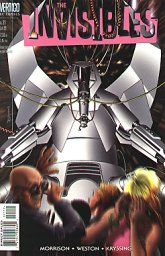 The argument that time is fractal actually has some merit, although few scientists would subscribe to McKenna's overall take. According to the theory, known as Time Wave Zero, the structure of time collapses into a state of infinite novelty in 2012.
The argument that time is fractal actually has some merit, although few scientists would subscribe to McKenna's overall take. According to the theory, known as Time Wave Zero, the structure of time collapses into a state of infinite novelty in 2012.